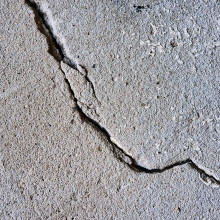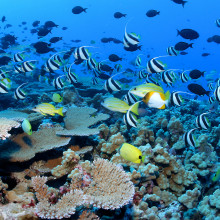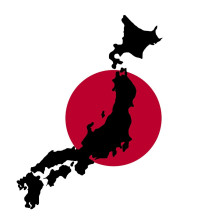Scientists successfully test a promising vaccine for pancreatic cancer, why Japan is finally casting off its remaining Covid-19 restrictions, and we’ll explore how a scientist is turning Yellowstone’s geology into stunning music...
In this episode

- Pancreatic cancer mRNA vaccine shows promise
Pancreatic cancer mRNA vaccine shows promise
Vinod Balachandran, Memorial Sloan Kettering Cancer Center
We are all aware of Messenger RNA vaccines thanks, largely, to their role in helping to turn the tide against Covid-19. But, before the pandemic had even begun, researchers in New York had been testing the same mRNA vaccine technology as a treatment for cancer. Vinod Balachandran, a surgical oncologist at the Memorial Sloan Kettering Cancer Center, announced they’ve successfully tested a personalised mRNA vaccine for pancreatic cancer. This was administered after the patients had undergone surgery to remove their tumours. So far, half of the trial participants have not seen their tumours return, suggesting the team are on to something…
Vinod - For pancreatic cancer, which is soon to become the second deadliest cause of cancer deaths in the United States. By 2025, there are really no effective treatments. About 88% die with our best current treatments. A rare 12% survive long-term. The reasons why they were able to do this were really unknown.
Chris - It's not just that those 12% present much earlier.
Vinod - That's a good question. And certainly if you have treatment sooner in general, outcomes are better. But this did not completely account for their exceptional long-term outcome as we had compared them to patients who had presented with similar stage and received similar treatments. So our hypothesis was that perhaps there might be some immune activity contributing to their exceptional outcomes.
Chris - If this is an immune effect, what do you suspect then that the immune system would be going after?
Vinod - The immune system we now know recognises cancers. They accumulate genetic errors called mutations. These generate new proteins in these cancers that the human body has never seen before. And this allows the immune system to now recognise these growing cancers as foreign and potentially kill them. So this was an inspiration for our vaccine idea for a clinical trial.
Chris - The idea being that given that you know that in some albeit rare groups of patients, if you make the right immune response, you seem to be able to cure yourself. Can we get the other 88% and persuade their immune system to cure them too with the help of a vaccine?
Vinod - Exactly. So perhaps what is happening in the long-term survivors is the best case scenario, if you will. And can we now try to induce this best case scenario when it does not happen spontaneously by delivering the mutated proteins as vaccines to patients.
Chris - Presumably you therefore had to hunt around and find out in each patient what the constellation of, of mutated altered proteins that their cancer was making were so that you could then harness those as a personalised vaccine for that person's disease.
Vinod - The strongest immune response found in these long-term survivors was specific or targeted towards mutations individual to every single patient's tumour. So to make a vaccine, this indicated that we would need to analyse the genetics of every single patient's tumour, identify the appropriate targets and make a vaccine. So it would be a custom vaccine for every single patient, which of course has its own logistical challenges.
Chris - How did you make the vaccines?
Vinod - We were immediately struck by the unique challenges that we would need to overcome for such a personalised vaccine approach, which would be, number one, you needed a vaccine delivery platform that would be fast because cancer patients require fast treatment. And also a vaccine delivery platform where you could incorporate several targets. And we thought at the time the optimal technology to do this was to use mRNA.
Chris - So presumably what you did was to take the genetic signatures of the tumours from your patients where you could see that there were specific changes in the proteins and take the bits of genetic material as mRNA that corresponds to those and turn that into the vaccine.
Vinod - Right. We started our clinical trial in December of 2019, so this was right before the pandemic. We did surgeries here in New York and within 72 hours we ship the tumours to colleagues in Germany. We then analyse the genetic composition of these tumours and then custom make a vaccine for every single patient and then deliver it back to us here in New York where we give it to patients. And overall, we ended up treating 16 patients with our immune therapies, which included individualised mRNA vaccines.
Chris - And what was the outcome?
Vinod - 50% of the patients who received the vaccines responded. So half.
Chris - How long a follow up do you now have on those responders and are they all still doing well?
Vinod - Right, so the follow-up we have on these patients is 18 months median follow-up. And at this time we find that the responders have not seen their pancreatic cancers come back. In contrast to patients who did not generate an immune response to the vaccine in whom the cancers came back on average about 13 months after surgery. Now this is still a small phase one clinical trial, but we think the results are encouraging and now warrants broader testing in more pancreatic cancer patients going forward.

- Commercial space station scheduled for 2025
Commercial space station scheduled for 2025
David Whitehouse
The aerospace startup Vast and Elon Musk’s SpaceX have announced that they intend to launch the first commercial space station in 2025. Nobody could dispute Vast’s confidence in the project, with the company reportedly selling tickets for its first crewed mission. So, what should we make of the bold proposal? Dr David Whitehouse is a space scientist and author of Space 2069: the future of spaceflight...
David - It's a very interesting project, and it will probably go very far because Vast Space are integrated with SpaceX, Elon Musk's outfit. Now, lots of American companies and startups have interests in building small space stations, and most of them are touting for investment and for business. But Vast Space have got Elon Musk on side. So they have a small space station, which is going to be launched by a Falcon Nine Rocket. Initially uncrewed. It's going to be tested in space. And this is not a very big satellite space station. It's the size of a moderately sized satellite, a communication satellite, for instance. So it's cope-able for a small company. And then eventually, I suppose the year or so later when it's tested out that we use a Dragon capsule that's already taken astronauts into orbit, as a sort of mini space station and to and from the Space Station, to go up and visit it.
Chris - Does this seem realistic? Two years away seems an incredibly optimistic timescale, or have they been doing so much work in the background that they are pretty confident they're going to deliver?
David - Well, this does seem to be credible, although you are quite right. Who knows how long it will take, because there could be some showstoppers along the way. And until it's actually ready to fly you are never really quite sure. But they have got a working relationship with SpaceX now. They've built their Dragon capsule, as I said, which can fly independently in space for several days. And a crew of four went up in the last year or so and just orbited the Earth without docking with anybody and had a great mission. So they have, if you like, the backup of SpaceX, they don't have to reinvent the wheel, they don't have to redesign life support systems and heating systems, because presumably what will happen is when a crew visit Haven One, Vast Space's first Space Station, they will live in the Dragon Capsule and only go through the airlock to Haven One to carry out experiments. So they're using a lot of what SpaceX has already developed.
Chris - What sort of experience are they offering? Because when you say this is satellite sized, it sounds pretty cramped.
David - Oh, yes. It will be nothing like the International Space Station. This will be a very small module, much smaller than the modules in which the astronauts live on the ISS. So it'll be limited to simple experiments, but what they're hoping is, if it's a success, they can start building it up module by module and expanding it in the same way that the International Space Station did. But clearly it's going to be very much more limited in terms of who can go there, how much equipment you can take up there, what you could bring back compared to the ISS, which is a tremendous facility. But of course the ISS is in its final years. It's going to be closed by 2030 at the latest, and Russia may pull out years before that. We don't know.
Chris - Do they see a gap in the market then? Is that the motivation for doing this? They see a space, if you will, opening up and the decline of the ISS, the decline of international relations with previous collaborators like Russia, meaning that there is this opportunity which this collaboration is seeking to plug into.
David - You are quite right. There is an opportunity here because the ISS is in its declining years because we can see an end to it because of the Russian components. Although Russian collaboration on the ISS has been going on almost independently of the international situation, the Russian components are beyond their useful lifetime in many respects, and they're starting to break down more. They're starting to show their age. So the Space Station is going to wind down in a few years time and become increasingly difficult to maintain. And NASA has said that it wants to see, and it will help fund, and it's already given money to three big aerospace corporations to develop smaller specialised space stations to do research into materials, into biology, into technology development, and even small hotels. So Vast Space's Haven One fits into, if you like, what could be a fleet of smaller space stations specialising in a way that the ISS was a mega space station, which did almost everything.
Chris - So it does have both a sort of commercial slash research aspect and a recreational aspect. They're eager to plug into both.
David - They are indeed because people will pay. There are, as we've seen with SpaceX, with other companies, there are people with a great deal of money who are willing to pay to go into space. SpaceX has already had several missions with its Dragon capsule, also to the Space Station, or as an independent free flying capsule with people who are eminently qualified to carry out research, to fly and command the capsule who are willing to pay a great deal of money for the mission. So as well as the founder of Vast Space, who I gather is a cryptocurrency billionaire, putting in $300 million of his own money. He could get probably more than that from a crew of four or several crude missions with people paying to go buy a seat.

Making music from earthquakes
Domenico Vicinanza, Anglia Ruskin University
A Cambridge scientist has been attempting to turn seismic activity - recorded in real time at Yellowstone National Park. Domenico Vicinanza, a senior lecturer at Anglia Ruskin University, explains how...
Domenico - The origin is one of the seismometer that is a scientific device that is picking up earth oscillation that is physically installed in the Yellowstone National Park in the US. Normally we used to see seismographs as a squiggly line drawn by a needle on a piece of paper. So what I've done is writing a piece of code that was translating the oscillation of the needle into musical oscillation. Imagine a melody that is going up and down exactly as the waveforms, as the needle, is going up and down. So if the needle is drawing, for example an upward movement followed by a downward movement, the melody will do exactly the same. It's going up and then it will be going down. The melody is tracing the same, and it's reproducing the same kind of behaviour. The needle is speaking in Yellowstone. If the Earth is oscillating very dramatically, a lot of seismic activity, big spikes, the melody will have the same dramatic behaviour, big intervals, high notes, low notes, giving a faithful representation of what's happening in Yellowstone.
Chris - And to be clear, these are not earthquakes going on. These are small tremors that are just the way the planet works.
Domenico - Yellowstone is one of the most seismically active areas of the United States, and the experience is an average of around 1500 to 2500 little earthquakes. The majority of them are too small to be felt by humans. The very fascinating things about Yellowstone's earthquakes or tremors is the fact half of them occur in swarms. They're actually clustered together. You can have many earthquakes. They can last for one, two days. To some of them they can last for months.
Chris - So what gave you the idea to turn them into music and why?
Domenico - I think there were mainly two things. The first one, we wanted to give a different perspective. We can actually listen to that. It actually has a really nice, interesting structure and offers a different way of perceiving and understanding science. Also, science can provide a different way to create music and create art.
Chris - It sort of adds an extra dimension to our ability to experience the data, doesn't it? So rather than just looking at a squiggly line or looking at a table full of numbers, you get to experience it viscerally through the musical representation.
Domenico - That's very true. We believe that music and sound in general can be a very useful and special way of experiencing science. Our ears are much more sensitive to patterns and changes than our eyes. I think music offers an absolutely unbelievably unique window into science in a way that is directly talking to us. You can immediately understand the flavour of what's happening there. If it is calm, agitated, dramatic, jittery, we can get that just by listening to it. There is a special beauty in that.
Chris - Previously you've done the Large Hadron Collider. You set the energy levels of the collisions there to music. So you've done hadrons, you've done earthquakes. What are you going to do next?
Domenico - We are thinking about whales at the moment using hydrophones, turning the sound of water, the vibrations and waters into melodies, offering different perspectives into modern biology. Hopefully.

- Fish 'sing' to communicate
Fish 'sing' to communicate
Miles Parsons, Australian Institute of Marine Science
How fish sing in a bid to communicate with one another...
Will - What you're hearing right now are fish - singing fish. Okay. Perhaps singing is somewhat inaccurate, but you can't deny there's something remarkable about the sound being made. These noises in question were recorded as part of a series of papers released by the International Quiet Ocean Experiment. A group of scientists hoping to survey and ID fish based on their acoustics all over the ocean. The IQOE has an offshoot organization called the Global Library of Underwater Biological Sounds or GLUBS, yes. And member Miles Parsons took me through how fish make these sounds and what they tell us about the fish in question.
Miles - These sounds are produced for many species by particular muscles that are used to contract around a swim bladder. A swim bladder is a little gassiest body that they normally use for buoyancy, but several species of fish have developed the ability to use that swim bladder to produce sound. So these muscles contract around it, they change the shape of the swim bladder, and as that's pulsating, it creates noise. So if you can imagine that you have a healthier fish, a bigger fish, they have longer, stronger muscles that can contract around that swim bladder and that takes ever so slightly longer to do it. So they actually create a deeper sound because of that. And you'll actually find that in some species, the females that might be trying to meet a mate are attracted to the deepest sounding voice. So the size of the fish and the sounds it produces essentially are related and the sound gives information about the fish producing the sound.
Will - So these noises can create a handy sound profile when trying to ID fish in murky or dark water. Much easier than having a look. But the fish aren't making the noises for us, so what are they trying to say?
Miles - There's quite a few reasons why fishes produce sound. The main one is realistically spawning, or reproduction. They also make sounds in terms of territorial defense. There's also distress or alarm signals that they give off. And some species we think, actually communicate to each other to talk about feeding. So you get what you have called an evening chorus, which is a lot of fish coming together. Now, whether or not the sound they produce is a byproduct of feeding or it's actually fish calling on mass to tell others where the food is at. We're not quite sure, but there's a number of different reasons for why they produce sound.
Will - So now we know how they do it and what they're trying to communicate. Do these noises change as the environment does? What causes a fish to change its tune?
Miles - It's all really related to the behaviour that's associated with the sound. So if we use spawning as an example, in Australia we have in this one River we've got a big fish called the mulloway. And this makes a loud croaking sound. If you listen through the hull of a boat, it sounds like someone farting. Now that sound is produced with spawning and they are trying to time their spawning for the maximum chances of success for their eggs. So it happens mostly after sunset. It happens when temperatures are high enough in the water for the fish to be able to spawn successfully, and it happens after high tide when the tide will take the eggs out from the river out to sea. So realistically, lots of these spawning, or whatever communication purposes they're using for sound, can be related to long-term environmental effects. So you'll get daily patterns, you'll get tidal patterns, you can get lunar patterns and you'll get seasonal patterns.
Will - But the factors behind changing a fish's noise are not limited to naturally occurring events. Humans are never far from the subject of altering a natural habitat.
Miles - Yes. So the most typical one there is vessel noise. And you'll have some species of fish that have been shown to stop calling when there's a vessel nearby. But one of the main problems really would be the communication space that they have if they're being exposed to noise. So if you think about it from the fish's point of view, you have a male trying to attract a female. The female can hear it a long distance away if it's nice and quiet, so you've got a good chance of them meeting up and having a successful mate. But if there's boats around, then those chances are much lower, mainly because they're using sound as their main method of meeting.
Will - But sound and the marine environment isn't a complete match made in hell. There are still many good things that we can use marine acoustics for when it comes to protecting fish as well.
Miles - One of the uses that you've got is fisheries management. You can actually locate these fish by the timing of their calling and the sounds that they're making. So that means that you can work out when and where their best chances of spawning are. And you can use that to identify what we call essential fish habitat. And in some cases you could have a space and timing based closure of a fishery so you can identify the periods where you don't want to have someone targeting them. And you can use that to help manage the fishery.

- Japan relaxes COVID restrictions
Japan relaxes COVID restrictions
Sir David Warren
Perhaps in the wake of the World Health Organization announcing last week that Covid is “no longer a crisis,” Japan’s government has finally downgraded the legal status of the virus in the country. It essentially means that Covid will no longer be in a special category, but will now be treated among diseases like seasonal flu. Meanwhile, if there is a spike in the Covid rate, a state of emergency will not be declared and people will be allowed to make decisions for themselves. Japanese health officials, however, are still urging caution and have said they will now begin preparing for the next major public health crisis. So, what should we make of it? Sir David Warren served as the UK’s ambassador to Japan between 2008 and 2012...
David - Japan has been wary about fully unlocking. That's certainly true. I think that when we look at Japan's reaction to the COVID pandemic worldwide, we are seeing a highly developed country with extremely good health systems and world class science research. Nevertheless, extremely cautious about the risks of a pandemic hitherto not experienced by any nation. And Japan has, I think it is fair to say, probably erred on the side of minimising risks as far as possible in dealing with the issue of covid. Although I never wants to make too many generalisations of a cultural kind there, there is a certain cultural issue there in terms of Japan's risk aversion, particularly when facing an unknown problem
Rhys - And the country's health chiefs are still urging caution to some extent. Why do you think that is, David?
David - I think they will be influenced in part by geopolitical concerns. Japan began to open up after a long period of restrictions late last year when it liberalised inward travel for foreign travellers as well as foreigners who were not resident in Japan. But with the upsurge of cases in China, which followed Xi Jinping's sudden lift of anti COVID policy measures in late 2022, I think the Japanese were hesitant about potential implications of a sudden upsurge of cases in China crossing over into Japan and what that would mean in terms of the Japanese health precautions. That wave has come and to a degree gone and now I think the Japanese feel a little more confident in liberalising the measures that they have put in place, both for foreign travellers generally and for Chinese travellers specifically.
Rhys - And do you think that the approach to COVID relates very much to the country's experience of SARS in the early 2000s? I mean, the health ministry has said that it's preparing for the next public health crisis and even the next pandemic.
David - I think it does. The SARS experience is very specific. I've lived in Japan on and off over many years since the 1970s and I know that Japan is a society which takes health extremely carefully. Where mask wearing, if you fear that you have or might get an infection, is very common where hygiene is extremely important. Those risk-averse behaviours definitely influence the development of Japanese policy. When I was in Japan in late 2022, not long after it had opened up and I was there on my first trip back for over three years, I was struck that mask wearing, which I'd expected to be pretty widespread, was almost universal, including in the streets as well as in crowded trains and tubes. That requirements to have one's temperature taken when one went into almost any public or private building were very widespread. And you could see how assiduous the Japanese are in sticking to the letter as well as the spirit of anti COVID precautions and checking that there's no danger of passing infections. So I think that we are seeing a final decision to liberalise, which reflects the WHO's announcement that the emergency has ended, but it's come after a period of extremely careful reflection analysis and great care in developing public policy.
Rhys - Japan's approach of course has had a huge impact on tourism, not least the Tokyo Games which were postponed and then held under very strict circumstances. How much do you think the decisions are going to reopen and encourage tourists back to Japan has played in this decision?
David - I think it represents an enormous element of the overall policy consideration. The number of foreign visitors plunged in Japan over the period of 2020, 2021. Obviously the money that they spent was a tiny fraction of what they were spending before the pandemic broke over us at the end of 2019. So I think there is a very strong economic case for liberalising these restrictions as soon as they felt they reasonably could. And we've seen maybe in common with a lot of other countries, the way in which the Japanese government have sought to keep these two elements in balance, opening up the country so that the country can begin to earn money not just from tourists, but from business interaction doing so carefully and cautiously so that they cannot be accused of putting the public's health at risk. But you are right. It's a very, very important element of this.










Comments
Add a comment